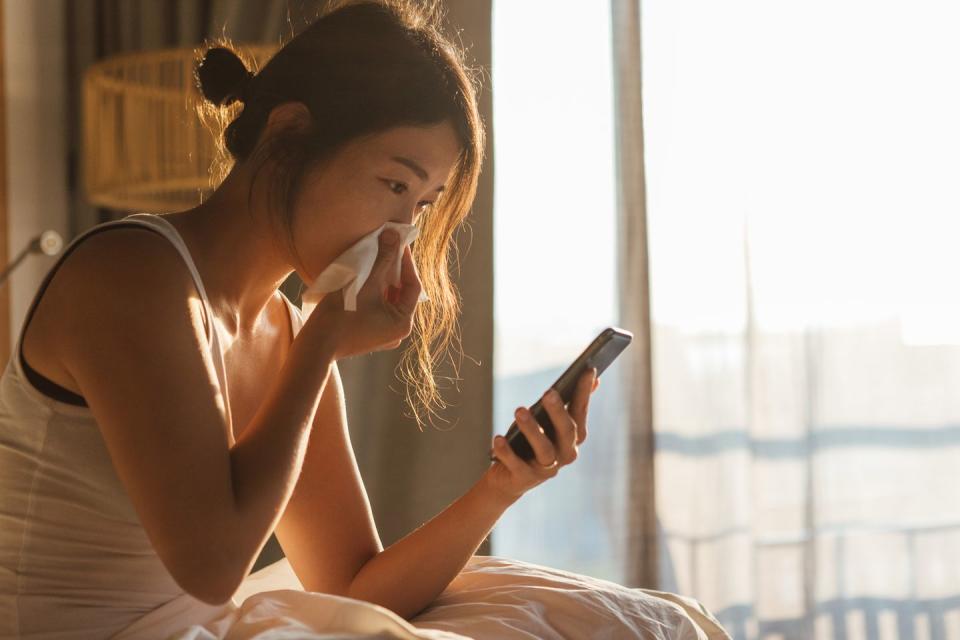Can your body actually delay getting sick until you 'have more time'?

I could feel it coming on for a few days prior: the scratchy throat, the runny nose and the faint threat of a full-blown headache. But, I decided, I don't have time to be ill until the weekend (can't these germs see I have deadlines?)... and when I woke up that Saturday morning, hey presto! There it was. I was officially sick with The Cold that everyone appears to be coming down with of late.
But is it really possible to 'delay' getting sick? And why is it that, anecdotally at least, so many of us seem to routinely fall ill on our days off, or whilst on holiday relaxing, or even over the Christmas break?
After posting on Instagram about this odd phenomenon, I immediately received dozens of messages from people saying they'd experienced something similar. One woman even told me she'd once felt a nasty bug appear the moment she'd delivered a big work presentation, theorising that her body may have been so full of adrenaline up until that moment that she hadn't been able to 'give in' to feeling poorly.
But is that really what's going on with our bodies when something like that happens?

"It isn't possible to 'delay' getting sick. However, it’s possible you might not notice you're becoming poorly until you have a break, especially if you’ve had a lot on," says Dr Luke Powles, Clinical Director, from Bupa Health Clinics, adding that our perception of how we’re feeling can very much change depending on our environment.
"The idea is that the more distractions we have, the less we notice our symptoms or feel ill. The free time that comes with a break may lead you to notice that you’re not feeling your best.
"Some people find that the rush to meet pre-holiday deadlines can be a busy and stressful time, putting a strain on your immune system and making it difficult to transition from work to leisure time. This can leave you more vulnerable to infection whilst you’re off too."
Dr Powles also shares that this stress causes the body to produce hormones, such as adrenaline and cortisol, and that these hormones act in different ways. "Adrenaline boosts your immune system, whereas cortisol suppresses it," he explains. "Once work pressures have eased and you’re feeling more relaxed, your body stops producing as much adrenaline and increases your cortisol levels, weakening your immune system. This again can leave you open to infection."
Similarly, after a stressful time, you might feel the 'let-down effect', which can result in mental health symptoms surfacing such as anxiety, depression, and irritability. When you experience these symptoms, they can – you've guessed it – weaken your immune system and lead to illness, too.
It seems this experience is also another way of highlighting how strong our brain-body connection truly is. "There is [such] a strong connection between mind and body which should never be underestimated," says Dr Becky Spelman, psychologist and clinical director of Private Therapy Clinic, when I asked if it's possible to schedule being unwell.

She adds that our childhood can come into play when dealing with sickness too. "Our parents' approach to self-care as we grew up matters. Those who were taught to listen to their body, take care of it and take the time and rest needed to recuperate when poorly will often respond better to illness than those who were taught that illness was a weakness, and who were encouraged to ignore any symptoms and keep going."
Dr Spelman also stresses it's crucial we allow ourselves proper and adequate time to rest when we become sick too. In our modern society, where being so busy you're almost at the point of snapping in half like gingerbread man is somewhat of a medal of honour, it's far too easy to put both our physical and emotional health on the back burner. The consequences of which can lead to longer recovery times – something that's never preferable.
Taking good care of our immune systems should be right at the top of our to-do lists, adds Dr Powles, usurping 'skipping that much-craved yoga class in order to respond to emails'.
"A strong immune system relies on paying attention to both your physical and mental health," he shares. "Boosting it isn’t something that you can achieve overnight, but if you take extra care of your immune system in the weeks running up to a break, it can make a big difference."
Go back to basics: ensure you’re getting enough sleep, partaking in regular exercise and eating a balanced diet rich with fruit and veg. "This helps your body to reset, gives you a hit of feel-good hormones and provides you with nutrients needed to help fight infection," Dr Powles notes, adding that getting a daily hit of vitamin D – either from a supplement or sunlight exposure – can also help to reduce infection rates in your body.
As for the mental health aspect, he advises speaking to somebody you trust if you have any worries, or journalling thoughts to help you manage them (but if your low mood or anxiety persists, or is interfering with your day-to-day, then talking to a professional, such as your GP or a charity like Mind is so important).
"Recognise the ways stress can show itself in your body," Dr Powles concludes. "If you’re feeling more alert than usual, your heart is racing or your muscles are feeling tense, make sure you’re taking time to relax and focus on your breathing, as often as you can."
And if you've also got The Cold that I came down with? A little bit of Lemsip and a chunky dose of laying in bed watching non-taxing movies goes a long way.
Follow Jennifer on Instagram and Twitter
You Might Also Like

 Yahoo Finance
Yahoo Finance 